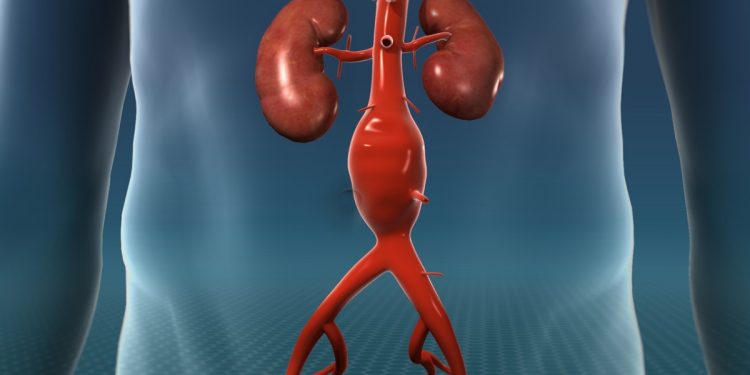Aortic aneurysms are a serious condition that requires prompt attention, especially when symptoms or risk factors are present. Early diagnosis is essential for effective treatment, which may involve medication or surgery depending on the size and location of the aneurysm.
An aortic aneurysm refers to a balloon-like bulge that develops in your aorta, the main artery responsible for transporting oxygen-rich blood from your heart to the rest of the body. These aneurysms form when a section of the artery wall becomes weakened, and they can appear anywhere along the aorta. The aneurysm may take on a round or tube-like shape and poses serious health risks, such as rupturing or splitting (dissection), which can lead to life-threatening internal bleeding or disrupt blood flow to vital organs. Immediate medical attention is crucial for anyone with an aortic aneurysm. Consider consulting experienced cardiologists at Apollo Gleneagles Hospital Kolkatafor expert care. Read on to learn more about the causes and treatments of aortic aneurysms.
Types of Aortic Aneurysms
There are two primary types of aortic aneurysms:
- Thoracic aortic aneurysm (TAA): This occurs in the portion of the aorta that runs through the chest.
- Abdominal aortic aneurysm (AAA): This type develops in the portion of the aorta that runs through the abdomen.
Abdominal aortic aneurysms are more common than thoracic ones, likely due to the thoracic aorta having a stronger and thicker wall compared to the abdominal aorta. In some cases, individuals may experience both types of aneurysms simultaneously. Identifying the type of aneurysm you have is crucial for determining the best course of action. Consult the best cardiologists in Kolkata to get an accurate diagnosis.
Symptoms of Aortic Aneurysms
Aneurysms often develop gradually over the years without noticeable symptoms. However, if the aneurysm enlarges quickly or ruptures, symptoms can appear suddenly and require immediate medical attention. A ruptured aneurysm is a life-threatening emergency, and its symptoms may include:
- Sudden, severe, and persistent pain in the back or abdomen, possibly radiating to the buttocks, groyne, or legs
- Clammy skin
- Fainting or loss of consciousness
- Dizziness
- Rapid heart rate
- Nausea and vomiting
- Shock
Detecting an aortic aneurysm before it ruptures significantly improves recovery chances. As the aneurysm enlarges, you may experience:
- A feeling of fullness after eating small amounts
- Shortness of breath or difficulty breathing
- Pain in the area where the aneurysm is growing (back, chest, neck, or abdomen).
- Swelling in the arms, face, or neck
- Difficulty or pain when swallowing
If you notice these symptoms, it’s highly advisable to consult a specialist, like the best cardiologists in Kolkata at Apollo Hospitals.
Causes of Aortic Aneurysms
The exact cause of an aortic aneurysm is often unclear, but several factors may contribute, including:
- Inflammation of the arteries
- Atherosclerosis (narrowing or hardening of the arteries)
- Injury to the aorta
- Inherited conditions, such as Ehlers-Danlos syndrome or Marfan syndrome
- Infections, like syphilis
Both lifestyle choices and genetic factors can influence the likelihood of developing an aortic aneurysm. People at higher risk include those who:
- Are over 65
- Smoke
- Have a family history of aortic aneurysms
- Were assigned male at birth
- Have high blood pressure (hypertension)
How are Aortic Aneurysms Treated?
If you have an unruptured aortic aneurysm, your doctor will closely monitor your condition. Those with risk factors may undergo regular screenings. The primary aim of treatment is to prevent your aneurysm from growing large enough to rupture or tear the artery. For smaller, unruptured aneurysms, medications may be prescribed to improve blood flow, manage cholesterol, or lower blood pressure, helping to slow the aneurysm’s growth and reduce pressure on the artery wall. In cases where the aneurysm is large and at risk of rupturing, surgery may be required. There are two main types of surgical procedures used to treat aortic aneurysms:
- Open aneurysm repair: In this procedure, the aneurysm is removed, and a graft (a specialised tube) is sewn in to repair the artery. This surgery may also be performed in the event of a rupture.
- Endovascular aneurysm repair (EVAR): A minimally invasive surgery in which a catheter is used to insert a graft to reinforce the artery. Variations of this procedure include fenestrated endovascular aneurysm repair (FEVAR) or thoracic endovascular aneurysm repair (TEVAR).
Recovery from aneurysm surgery can take a month or longer, and ongoing monitoring is essential to check for any changes in the aneurysm or complications. Most patients have successful outcomes after surgery.
Conclusion
Early detection and timely intervention are critical in managing aortic aneurysms and preventing severe complications like rupture. While some aneurysms can be treated with medications to slow their growth, larger or high-risk aneurysms may require surgery. Regular monitoring and maintaining a healthy lifestyle can also help mitigate the risks associated with this condition. If you’re at risk or suspect you have an aortic aneurysm, consulting experts like the cardiologists at Apollo Gleneagles Hospital Kolkata can provide you with the specialised care and treatment necessary to manage your health effectively.
Reference Links:
https://www.mayoclinic.org/diseases-conditions/aortic-aneurysm/symptoms-causes/syc-20369472
https://www.nhlbi.nih.gov/health/aortic-aneurysm
https://my.clevelandclinic.org/health/diseases/16742-aorta-aortic-aneurysm https://www.cdc.gov/heart-disease/about/aortic-aneurysm.html
https://medlineplus.gov/ency/article/000162.htm
https://www.heart.org/en/health-topics/aortic-aneurysm













